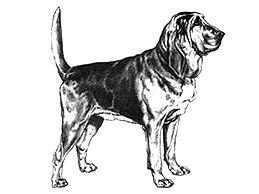Bloodhound
Last updated: 02 Jul 2009
A breed standard is the guideline which describes the ideal characteristics, temperament, and appearance of a breed and ensures that the breed is fit for function with soundness essential. Breeders and judges should at all times be mindful of features which could be detrimental in any way to the health, welfare or soundness of this breed.

Kennel Club, London 1994
-
Group:
Group 4 (Hounds)
-
History:
-
General Appearance:
Noble and dignified expression, characterised by solemnity, wisdom and power.
-
Characteristics:
Possesses in a most marked degree every point and characteristic of those dogs which hunt together by scent (Sagaces). Very powerful, standing over more ground than is usual with hounds of other breeds. Skin relatively loose.
-
Temperament:
Affectionate, neither quarrelsome with companions nor with other dogs. Somewhat reserved and sensitive.
-
Head And Skull:
Head narrow in proportion to length and long in proportion to body, tapering slightly from temples to muzzle, thus when viewed from above and in front having an appearance of being flattened at sides and of being nearly equal in width throughout entire length. In profile upper outline of skull is nearly in same plane as that of foreface. Length from end of nose to stop not less than that from that from stop to back of occipital protuberance. Entire length of head from posterior part of occipital protuberance to end of muzzle 30cms (12 ins) or more in dogs and 28cms (11 ins) or more in bitches. Skull is long and narrow, with occipital peak pronounced. Foreface long, deep and of even width throughout, with square outlines when seen in profile. Head furnished with only a small amount of loose skin. Nostrils large and open. In front, lips falling squarely making a right angle with upper line of foreface.
-
Eyes:
Medium size, dark brown or hazel, neither sunken nor prominent, the lids being oval in shape and meeting the cornea (front window of the eye) perfectly without any irregularity in their contour. Eyes should be free from any interference from the eyelashes. Signs of any obvious eye irritation must be heavily penalised.
-
Ears:
Thin and soft to the touch, long, set on low and falling in graceful folds, lower parts curling inwards and backwards.
-
Mouth:
Jaws strong with a perfect, regular and complete scissor bite, i.e. Upper teeth closely overlapping lower teeth and set square to the jaws.
-
Neck:
-
Forequarters:
Shoulders muscular and well sloped. Forelegs straight, large, round in bone with elbows well set in. Pasterns strong.
-
Body:
Ribs well sprung, chest well let down between forelegs forming a deep keel. Back and loins strong, the latter deep and slightly arched.
-
Hindquarters:
Thighs and second thighs very muscular. Hocks well let down, bent and squarely set.
-
Feet:
Strong and well knuckled up.
-
Tail:
(Stern) Long, thick, tapering to a point, set high with moderate amount of hair underneath. Carried scimitar fashion, but not curled over back or corkscrew any time. When moving carried high.
-
Gait/Movement:
-
Coat:
Smooth, short and weatherproof.
-
Colour:
Black and tan, liver and tan (red and tan) and red. Darker colours sometimes interspersed with lighter or badger coloured hair and sometimes flecked with white. Small amount of white permissible on chest, feet and tip of tail.
-
Sizes:
Height:
Adult dogs 66 cms (26 ins)
Adult bitches 61 cms (24 ins)
Dogs usually vary from 63-69 cms (25-27 ins)
Bitches usually vary from 58-63 cms (23-25 ins)
Mean average weight: Adult Dogs 41 kgs (90 lbs) in fair condition.
Mean average weight: Adult Bitches 36 kgs (80 lbs) in fair condition
Dogs attain the weight of 50 kgs (110 lbs)
Bitches attain the weight of 45.5 kgs (100 lbs)
Hounds of the maximum height and weight preferred, providing that quality, proportion and balance combine.
-
Faults:
Any departure from the foregoing points should be considered a fault and the seriousness with which the fault should be regarded should be in exact proportion to its degree and its effect upon the health and welfare of the dog.
-
Notes:
Male animals should have two apparently normal testicles fully descended into the scrotum.
 For owners
For owners
 Members
Members
 Dogs Australia is a not-for-profit organisation advocating for the preservation of purebred dogs through ethical breeding.
It champions the highest standard of animal welfare through education and fostering dog-loving communities.
Internationally recognised and established in 1958 as the Australian National Kennel Council (ANKC),
the organisation promotes responsible dog ownership; maintains the ORCHID* heritable canine diseases database;
funds research into canine diseases; and supports state and territory-based member bodies.
Dogs Australia promotes breed conformation shows and community sports for dogs that fulfil a breed’s natural instincts.
Dogs Australia is a not-for-profit organisation advocating for the preservation of purebred dogs through ethical breeding.
It champions the highest standard of animal welfare through education and fostering dog-loving communities.
Internationally recognised and established in 1958 as the Australian National Kennel Council (ANKC),
the organisation promotes responsible dog ownership; maintains the ORCHID* heritable canine diseases database;
funds research into canine diseases; and supports state and territory-based member bodies.
Dogs Australia promotes breed conformation shows and community sports for dogs that fulfil a breed’s natural instincts.







